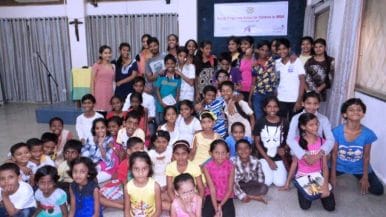
Jun 24, 2016 | Focolare Worldwide
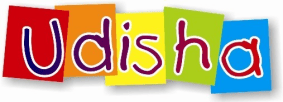 “Here I learned how to dialogue with my children, and I shall surely return to know more,” remarked one of the mothers dressed in a sari. One of the fathers said, “I have decided to dedicate more time for my children.” The comments came from two of the 60 participants attending the course on parenting held at Udisha, which was entitled: “Children – the future of our nation”. After school, in the same facilities, their children are given a snack, toys and after-school activities. For some of the parents, the themes dealt with were a surprising novelty, while for others they were eye-openers to their own mistakes and the dangers and risks to which their children are exposed. But the course was not the only a promotion addressing the parents.
“Here I learned how to dialogue with my children, and I shall surely return to know more,” remarked one of the mothers dressed in a sari. One of the fathers said, “I have decided to dedicate more time for my children.” The comments came from two of the 60 participants attending the course on parenting held at Udisha, which was entitled: “Children – the future of our nation”. After school, in the same facilities, their children are given a snack, toys and after-school activities. For some of the parents, the themes dealt with were a surprising novelty, while for others they were eye-openers to their own mistakes and the dangers and risks to which their children are exposed. But the course was not the only a promotion addressing the parents.  In this 5th year of Udisha – one of the social projects of the Focolare for disadvantaged children, teens and families – there is also the opportunity to obtain a microcredit, thanks to which the economy of many families has decisively improved. Especially the women have gained access to an initial subsidy and many have been able to open small handicraft or business activities such as the production of crochet bags or selling cooked food. Already 52 mothers hold monthly group meetings to share their entrepreneurial experiences and solve some common problems together. Other successful activities this year was the prophylaxis against typhus, which was beneficial to 107 children and adults, and 72 adults and 95 kids were vaccinated against German measles. But the greatest efforts of the project addressed the kids who were involved in new activities. Independence Day on 15 August was celebrated with the flag-raising ceremony, accompanied by patriotic songs and poems. In September instead, on the occasion of the Bandra fair – one of the city’s most important events – children and parents had a field trip to the Mount Mary Basilica. Also in September, India celebrated teachers’ day and the children once again thanked their educators with a song, dance and theater performance.
In this 5th year of Udisha – one of the social projects of the Focolare for disadvantaged children, teens and families – there is also the opportunity to obtain a microcredit, thanks to which the economy of many families has decisively improved. Especially the women have gained access to an initial subsidy and many have been able to open small handicraft or business activities such as the production of crochet bags or selling cooked food. Already 52 mothers hold monthly group meetings to share their entrepreneurial experiences and solve some common problems together. Other successful activities this year was the prophylaxis against typhus, which was beneficial to 107 children and adults, and 72 adults and 95 kids were vaccinated against German measles. But the greatest efforts of the project addressed the kids who were involved in new activities. Independence Day on 15 August was celebrated with the flag-raising ceremony, accompanied by patriotic songs and poems. In September instead, on the occasion of the Bandra fair – one of the city’s most important events – children and parents had a field trip to the Mount Mary Basilica. Also in September, India celebrated teachers’ day and the children once again thanked their educators with a song, dance and theater performance.  On 2 October, feast of the father of the nation – Mahatma Gandhi – the celebration started with the thoughts of Gandhi on nonviolence and peace, and reflections on the poverty of many children living on the streets and the importance of sharing. Despite their extreme poverty, also the Udisha children wanted to share the little they had: some clothing item, a small toy, or some sweets. And discussing among themselves, they also listed many other things to share: their ideas, joy, and smiles. The Diwali (Feast of Light) is India’s most important feast that takes place for four days between October and November every year – during which the children of Udisha used all their creativity in painting terracotta vases and drawing pictures with coloured powder. It was their way of contributing to the project, mostly through a distance-financing from a nonprofit AFN organization. The intensity with which the children of Udisha absorb the “culture of giving” is really impressive. This inspiring idea is the core of the project and education they receive, and a value that is conveyed to them not only through words but through the concrete love of the volunteers onsite, and those across the ocean, whom they have never met but who care for them.
On 2 October, feast of the father of the nation – Mahatma Gandhi – the celebration started with the thoughts of Gandhi on nonviolence and peace, and reflections on the poverty of many children living on the streets and the importance of sharing. Despite their extreme poverty, also the Udisha children wanted to share the little they had: some clothing item, a small toy, or some sweets. And discussing among themselves, they also listed many other things to share: their ideas, joy, and smiles. The Diwali (Feast of Light) is India’s most important feast that takes place for four days between October and November every year – during which the children of Udisha used all their creativity in painting terracotta vases and drawing pictures with coloured powder. It was their way of contributing to the project, mostly through a distance-financing from a nonprofit AFN organization. The intensity with which the children of Udisha absorb the “culture of giving” is really impressive. This inspiring idea is the core of the project and education they receive, and a value that is conveyed to them not only through words but through the concrete love of the volunteers onsite, and those across the ocean, whom they have never met but who care for them.

Jun 23, 2016 | Focolare Worldwide
 Nearly two months have gone by since Ecuador was hit by a disastrous earthquake. The Focolare Movement immediately began a fundraising effort to meet requests for basic necessities, and it set up a work group coordinated by the United World Association and the New Families NPO Association. The generous support of people from around the world arrived quickly, and we have now ready to send the first funds that will provide people of Ecuador with such things as food, sanitation and psychological support. This assistance will be directed especially to families from the Provinces of Manabi and Espmeraldes, which suffered the most damage. In partnership with the local NGO, Fondo Ecuatoriano Populorum Progressio (FEPP), the first six-month phase will focus on studying the reconstruction of infrastructure and returning local production. The study will work in collaboration with the international network of architects known as “Arquitecturalimite” which specializes in designing services in contexts where there is socio-economic exclusion. On November 9 – 13, 2016, while a course on peace is being offered to young people, a series of architectural workshops will be taking place to deal with possible responses to the earthquake disaster. How you can help Source: AMU – AFN Onlus
Nearly two months have gone by since Ecuador was hit by a disastrous earthquake. The Focolare Movement immediately began a fundraising effort to meet requests for basic necessities, and it set up a work group coordinated by the United World Association and the New Families NPO Association. The generous support of people from around the world arrived quickly, and we have now ready to send the first funds that will provide people of Ecuador with such things as food, sanitation and psychological support. This assistance will be directed especially to families from the Provinces of Manabi and Espmeraldes, which suffered the most damage. In partnership with the local NGO, Fondo Ecuatoriano Populorum Progressio (FEPP), the first six-month phase will focus on studying the reconstruction of infrastructure and returning local production. The study will work in collaboration with the international network of architects known as “Arquitecturalimite” which specializes in designing services in contexts where there is socio-economic exclusion. On November 9 – 13, 2016, while a course on peace is being offered to young people, a series of architectural workshops will be taking place to deal with possible responses to the earthquake disaster. How you can help Source: AMU – AFN Onlus
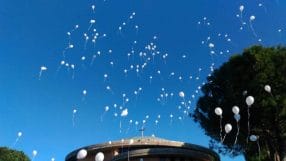
Jun 20, 2016 | Focolare Worldwide
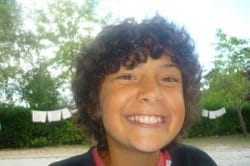 The moment news of his illness spread, the friends of Andrea, together with the boys and adults of Appignano started to join forces with the family in the small chapel of Madonna Addolorata. Every time the number grew and intensified their prayers for the healing of Andrea. As his hospitalization extended, they asked with faith that also Andrea’s family would find strength and peace, and that Andrea would never feel alone, even when he had to face checkups and treatments and would not suffer excessively. Precisely this year his class was preparing the children and their parents for the first communion, and all together decided to postpone the event to next year, to allow Andrea to receive the sacrament with all of them.
The moment news of his illness spread, the friends of Andrea, together with the boys and adults of Appignano started to join forces with the family in the small chapel of Madonna Addolorata. Every time the number grew and intensified their prayers for the healing of Andrea. As his hospitalization extended, they asked with faith that also Andrea’s family would find strength and peace, and that Andrea would never feel alone, even when he had to face checkups and treatments and would not suffer excessively. Precisely this year his class was preparing the children and their parents for the first communion, and all together decided to postpone the event to next year, to allow Andrea to receive the sacrament with all of them. 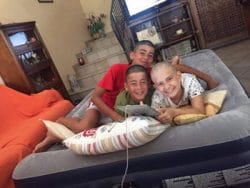 Finally Andrew returned home, and his friends, knowing that his hair had fallen due to the therapy, decided to cut their hair short to welcome him back. Meantime, Andrea, like a real trooper of serenity continued the treatments, without losing his wonderful smile. After two years, Andrea seemed to have been healed, so much so that he was able to participate in the summer training course, and subsequently, in the weekly meetings of the Diocesan Movement of the Focolare.
Finally Andrew returned home, and his friends, knowing that his hair had fallen due to the therapy, decided to cut their hair short to welcome him back. Meantime, Andrea, like a real trooper of serenity continued the treatments, without losing his wonderful smile. After two years, Andrea seemed to have been healed, so much so that he was able to participate in the summer training course, and subsequently, in the weekly meetings of the Diocesan Movement of the Focolare. 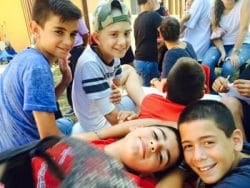 Something new came up in 2016: the checkups revealed the need for a new round of treatments and which also this time seemed to give positive results. But precisely upon returning home from a Gen3 meeting, a serious crisis forced him to an urgent hospitalisation. Something indescribable then happened in Appignano. Thrice a week his classmates and all those of the School, together with the young friends of Federica, his sister and the many people closet o the family, started to fill the crape of Addolorata. The kids themselves led the prayers, in an amazing spiritual atmosphere of faith in God who is Love, certain that all He sent or allows to happen, always leads to the Good. A certainty that, even when Andrea, at the age of 13 left this earthly existence, his presence in the community of Appignano has never diminished. For two days there was an uninterrupted pilgrimage of kids and adults to the Addolorata chapel where – where Andrew lay – to gather round the family with wake shifts so that he was never left alone. At the funeral celebrated in the parish, the church could not contain all the people. The celebrant spoke of Andrew as a “trooper” and a “teacher of life” and in recalling the strength with which he faced his illness, underlined with amazement his deep sense of humanity, fraternity and faith which the boy managed to imbue in the entire community. At the end, the children and kids launched hundreds of white balloons in the sky, as a symbol of the certainty that Andrew is now in Heaven and their great support to the family: an event that went viral on the network.
Something new came up in 2016: the checkups revealed the need for a new round of treatments and which also this time seemed to give positive results. But precisely upon returning home from a Gen3 meeting, a serious crisis forced him to an urgent hospitalisation. Something indescribable then happened in Appignano. Thrice a week his classmates and all those of the School, together with the young friends of Federica, his sister and the many people closet o the family, started to fill the crape of Addolorata. The kids themselves led the prayers, in an amazing spiritual atmosphere of faith in God who is Love, certain that all He sent or allows to happen, always leads to the Good. A certainty that, even when Andrea, at the age of 13 left this earthly existence, his presence in the community of Appignano has never diminished. For two days there was an uninterrupted pilgrimage of kids and adults to the Addolorata chapel where – where Andrew lay – to gather round the family with wake shifts so that he was never left alone. At the funeral celebrated in the parish, the church could not contain all the people. The celebrant spoke of Andrew as a “trooper” and a “teacher of life” and in recalling the strength with which he faced his illness, underlined with amazement his deep sense of humanity, fraternity and faith which the boy managed to imbue in the entire community. At the end, the children and kids launched hundreds of white balloons in the sky, as a symbol of the certainty that Andrew is now in Heaven and their great support to the family: an event that went viral on the network.  A labourer, head of a family, observed: “What impresses me most is the great number of people of various nationalities and religions. It is a real lesson also for us adults who often forget that humanity which unites us all. Andrea and his friends are our teachers of life” And a girl wrote “We prayed so hard for a miracle. And the miracle came about: a child was able to unite an entire town around him, and this is something inexpiable.” At the cemetery a girl, upon seeing a woman sobbing, went up to her and said: “Don’t cry. Andrew is now with Jesus.” Two months have passed and the prayer sessions in have continued every Wednesday, “It’s important that we do so,” one of the kids said. “We need to go ahead so that the fruits of the life of Andrew – that’s how I like to consider them– can continue to bear fruit among us.”
A labourer, head of a family, observed: “What impresses me most is the great number of people of various nationalities and religions. It is a real lesson also for us adults who often forget that humanity which unites us all. Andrea and his friends are our teachers of life” And a girl wrote “We prayed so hard for a miracle. And the miracle came about: a child was able to unite an entire town around him, and this is something inexpiable.” At the cemetery a girl, upon seeing a woman sobbing, went up to her and said: “Don’t cry. Andrew is now with Jesus.” Two months have passed and the prayer sessions in have continued every Wednesday, “It’s important that we do so,” one of the kids said. “We need to go ahead so that the fruits of the life of Andrew – that’s how I like to consider them– can continue to bear fruit among us.”

Jun 18, 2016 | Focolare Worldwide
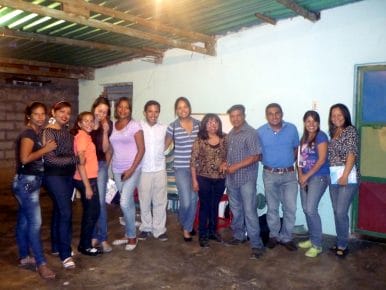 “On my way home,” recounts Ofelia who is from a small district of Valencia, the third largest city of Venezuela, “I saw a couple going home on foot. I slowed down and asked if they wanted a ride. Exhausted and breathless, they got into the car immediately. After getting their breath back they told me that they had awoken very early to go and buy flour and other basic foodstuffs for their kids, but the queue was so long that when their turn came, there was nothing left. Disappointed, they told themselves that the only thing they would return home with was a big headache since they had not had breakfast or lunch.” These painful and unfortunately recurring situations often go unanswered since even Ofelia had nothing to give them. Her purse was empty and she was jobless. The widespread lack of means of livelihood pushed the Focolare community in Venezuela to help one another in all ways. For example, the ladies offer one another hairstyling services and mend old clothes to give to those in need, so as to be neat and orderly despite their poverty, and testify also visibly to the evangelical love they try to live amongst them. “One day,” the head of a family recounted, “I went to buy some food, but there was nothing available and it seemed like everything had disappeared. On doing our rounds I spotted some foruro or toasted maize. We generally do not eat this, but we recalled that one of our friend’s family ate it, and I thought that it was better than nothing. In the afternoon, passing by their home, I dropped by to ask whether they had eaten lunch. The wife said “no, not even breakfast. We have no money and my husband has weakened due to hunger.” I told her that they couldn’t go to bed without eating something, and ran to take the foruro I had bought. That evening for me was really joyful since they were able to have dinner, even if only with just foruro. One day, Laura was stopped by a woman who confided her worries since she could not find the medicine for her hypertension. She herself instead managed to get the drugs through acquaintances from abroad. In times like this, it would be prudent to keep these items for oneself, also because you never know whether you will be able to procure them again. But in the Gospel Jesus said «give and you will receive, and without thinking twice, opened her bag and gave her a whole blister pack of pills.
“On my way home,” recounts Ofelia who is from a small district of Valencia, the third largest city of Venezuela, “I saw a couple going home on foot. I slowed down and asked if they wanted a ride. Exhausted and breathless, they got into the car immediately. After getting their breath back they told me that they had awoken very early to go and buy flour and other basic foodstuffs for their kids, but the queue was so long that when their turn came, there was nothing left. Disappointed, they told themselves that the only thing they would return home with was a big headache since they had not had breakfast or lunch.” These painful and unfortunately recurring situations often go unanswered since even Ofelia had nothing to give them. Her purse was empty and she was jobless. The widespread lack of means of livelihood pushed the Focolare community in Venezuela to help one another in all ways. For example, the ladies offer one another hairstyling services and mend old clothes to give to those in need, so as to be neat and orderly despite their poverty, and testify also visibly to the evangelical love they try to live amongst them. “One day,” the head of a family recounted, “I went to buy some food, but there was nothing available and it seemed like everything had disappeared. On doing our rounds I spotted some foruro or toasted maize. We generally do not eat this, but we recalled that one of our friend’s family ate it, and I thought that it was better than nothing. In the afternoon, passing by their home, I dropped by to ask whether they had eaten lunch. The wife said “no, not even breakfast. We have no money and my husband has weakened due to hunger.” I told her that they couldn’t go to bed without eating something, and ran to take the foruro I had bought. That evening for me was really joyful since they were able to have dinner, even if only with just foruro. One day, Laura was stopped by a woman who confided her worries since she could not find the medicine for her hypertension. She herself instead managed to get the drugs through acquaintances from abroad. In times like this, it would be prudent to keep these items for oneself, also because you never know whether you will be able to procure them again. But in the Gospel Jesus said «give and you will receive, and without thinking twice, opened her bag and gave her a whole blister pack of pills.  In this country’s difficult situation, the visit of Cecilia di Lascio (21-25 May) Argentinean, and regional coordinator of the Political Movement for Unity, was really timely. In Caracas, she had an interesting meeting with 75 people who wanted to commit themselves for the common good, and among whom were various young people: in the hall of the National Assembly she presented the ideal of unity to a group of people who were interested in politics, and before leaving the country held a meeting with a group of university professors on how to educate the youth according to the paradigm of fraternity in the various disciplines of knowledge and human activities. Two important events were also held in the encounter with Dr. Lombardi, of the Cecilio Acosta University, and a meeting with the RUEF (University network of studies on Fraternity) commission. All this contributed to acquiring greater comprehension of the political process taking place in the country. “We have to focus on equity, the central objective and start off from the paradigm of fraternity,” Dr Lascio affirmed in her various speeches. “In this difficult situation I firmly believe in the importance of working together for the common good.”
In this country’s difficult situation, the visit of Cecilia di Lascio (21-25 May) Argentinean, and regional coordinator of the Political Movement for Unity, was really timely. In Caracas, she had an interesting meeting with 75 people who wanted to commit themselves for the common good, and among whom were various young people: in the hall of the National Assembly she presented the ideal of unity to a group of people who were interested in politics, and before leaving the country held a meeting with a group of university professors on how to educate the youth according to the paradigm of fraternity in the various disciplines of knowledge and human activities. Two important events were also held in the encounter with Dr. Lombardi, of the Cecilio Acosta University, and a meeting with the RUEF (University network of studies on Fraternity) commission. All this contributed to acquiring greater comprehension of the political process taking place in the country. “We have to focus on equity, the central objective and start off from the paradigm of fraternity,” Dr Lascio affirmed in her various speeches. “In this difficult situation I firmly believe in the importance of working together for the common good.”
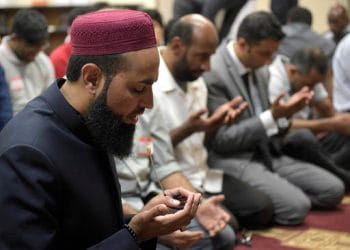
Jun 17, 2016 | Focolare Worldwide
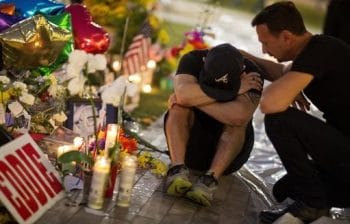 “When the telephone rang on Sunday morning, at the other end of the line was my husband’s son weeping: his friend had been among the victims of the massacre in Orlando. The tragedy had come right into our own home.” Kathie felt that the only possible response to such pain was love. She gathered the family: “We joined the 18:00 moment of silence that enveloped the city and the state, and then we went to Mass to pray that God would comfort the families, the wounded, my stepson and his friends.” Eva’s beauty parlour is only a few miles from the Pulse, and her colleagues knew several of the club’s customers. “I hadn’t turned on the TV and wasn’t particularly alarmed by the sound of sirens in the night, so I heard about the shooting at church where it was announced that one of our parishioners had been killed. They were our friends. What happened to them could have happened to me or to others around me. I asked myself if I had really done my best to love the people right beside me. Bullets had killed those young people, but I couldn’t make love die.”
“When the telephone rang on Sunday morning, at the other end of the line was my husband’s son weeping: his friend had been among the victims of the massacre in Orlando. The tragedy had come right into our own home.” Kathie felt that the only possible response to such pain was love. She gathered the family: “We joined the 18:00 moment of silence that enveloped the city and the state, and then we went to Mass to pray that God would comfort the families, the wounded, my stepson and his friends.” Eva’s beauty parlour is only a few miles from the Pulse, and her colleagues knew several of the club’s customers. “I hadn’t turned on the TV and wasn’t particularly alarmed by the sound of sirens in the night, so I heard about the shooting at church where it was announced that one of our parishioners had been killed. They were our friends. What happened to them could have happened to me or to others around me. I asked myself if I had really done my best to love the people right beside me. Bullets had killed those young people, but I couldn’t make love die.”
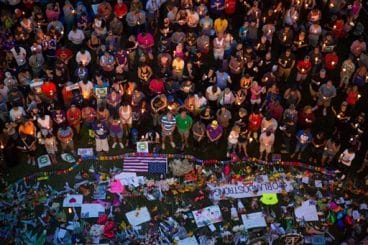
Mourners attend a candlelight vigil in Orlando
 There is a strong risk that Muslims will again be blamed of favouring great acts of violence, but the reality is altogether different, because they were the first to step up and donate blood for the many wounded and, in many cities, the night prayer during Ramadan was dedicated to the murder victims of Orlando. Sandra, Milagros and Joyce, who are less than 70 years old between them, had to admit once more that the Gospel is the only weapon that doesn’t injure others, but only one’s own egoism and pride. “It’s all so senseless what we are going through, but we can’t let ourselves be paralyzed by fear. We have to demonstrate that love, precisely because it begins small – from peace in our workplaces and with our neighbours – can change much and bring hope and forgiveness.” “On Sunday morning, when I learned of the tragic events far from my home, among people whose choices were different from mine, I thought that difference cannot divide us: They’re my brothers and sisters.” With these words Celi began her testimony, her network of prayer and communion. “The only answer to hatred and terrorism is to never stop living by this belief in love and, especially, to do it together with all the people who never stop extending God’s caress to everyone.”
There is a strong risk that Muslims will again be blamed of favouring great acts of violence, but the reality is altogether different, because they were the first to step up and donate blood for the many wounded and, in many cities, the night prayer during Ramadan was dedicated to the murder victims of Orlando. Sandra, Milagros and Joyce, who are less than 70 years old between them, had to admit once more that the Gospel is the only weapon that doesn’t injure others, but only one’s own egoism and pride. “It’s all so senseless what we are going through, but we can’t let ourselves be paralyzed by fear. We have to demonstrate that love, precisely because it begins small – from peace in our workplaces and with our neighbours – can change much and bring hope and forgiveness.” “On Sunday morning, when I learned of the tragic events far from my home, among people whose choices were different from mine, I thought that difference cannot divide us: They’re my brothers and sisters.” With these words Celi began her testimony, her network of prayer and communion. “The only answer to hatred and terrorism is to never stop living by this belief in love and, especially, to do it together with all the people who never stop extending God’s caress to everyone.”
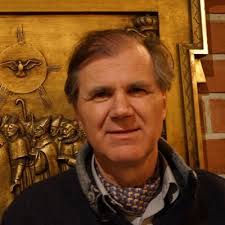
Jun 16, 2016 | Focolare Worldwide
 “Christians in Festival” was the title chosen for a large ecumenical gathering in Nizza, France where Swiss Reformed Pastor, Martin Hoegger, was invited to give his testimony on “Christ, light of my life” and on how it led him from atheism to belief. We offer some excerpts, but the complete text in French can be found on his blog. “At the age of 18 I was asking many questions about the meaning of life. I was wondering which studies I should take up. I was quite knowledgeable in philosophy and literature, but I wasn’t searching for wisdom. I also wanted to know God. I enrolled at the school of theology in Lausanne. I was drawn to the study of religion, and I imagined I would find my way in theology. But the more I went ahead the more the questions increased. Ten months later I was an atheist. One day I went into a church and posted my rebellion on the lectern: ‘God doesn’t exist!’ I decided to give my studies, but the questions continued. Sometime later I met a friend who invited me to attend a meeting in Aix-en-Provence at a Protestant school of theology. That’s where God was waiting for me. I was touched by the fraternal atmosphere that was flowing among the people at that meeting. That night I knelt down in my bedroom, and only one word came to my lips: “Sorry”. I was surprised. To whom had I spoken that word? Deep down I knew why I had said it: At that time I was in conflict with a lot of people and had offended quite a few. When I got home, I went to them to ask ‘forgiveness’. Each time was a new experience of light: I experienced Christ waiting for me in others, especially in the most disadvantaged. So I sought contact with other Christians. Up until that day I had lived life on my own. Now, I had discovered the light of the Risen Jesus that illuminates those who gather in his name. I’ll share with you three experiences on the Word that have a strong ecumenical dimension. The School of the Word: When I was director of the Swiss Bible Society, I entered in contact with Cardinal Martini, the then archbishop of Milan. He was gathering thousands of young people to experience lectio divina. Several people involved in youth ministry from the Catholic, Reformed and Evangelical Churches in Switzerland were interested in the experience. The Cardinal invited us to launch an ecumenical School of the Word. We experienced that getting together to listen to Christ unites us at a very deep level. The Word of Life as “light for my path” (Ps 119,105). The Word of Life is put out by the Focolare Movement, which I’ve been involved with for some twenty years. It’s a Bible verse that we meditate on for one month, but especially try to live in our daily lives and share the fruits with one another. I proposed it to the parishioners in the parish where I exercise my Ministry: It renewed the parish. Celebration of the Word every first Sunday of the month at the Cathedral of Lausanne. The Community of Churches from the Canton of Vaud invited the 20 churches that belong to it. Since 2004 over a hundred such celebrations have been held there. It’s been a fine ecumenical apprenticeship in which we discover our diversity and rejoice in it. It encourages us not be afraid of our differences and to give thanks for the gifts that have been accorded to others, and which never cease to enrich us. This precious initiative has been most useful in helping us to walk together as Christians towards unity. Gathering again and again in the presence of God, to listen to his Word is to already anticipate a full communion. By prayer the Holy Spirit already unites us, and that’s why Christ is light in my life.” Maria Chiara De Lorenzo Blog of Martin Hoegger Address of His Holiness Pope Francis to the World Communion of Reformed Churches
“Christians in Festival” was the title chosen for a large ecumenical gathering in Nizza, France where Swiss Reformed Pastor, Martin Hoegger, was invited to give his testimony on “Christ, light of my life” and on how it led him from atheism to belief. We offer some excerpts, but the complete text in French can be found on his blog. “At the age of 18 I was asking many questions about the meaning of life. I was wondering which studies I should take up. I was quite knowledgeable in philosophy and literature, but I wasn’t searching for wisdom. I also wanted to know God. I enrolled at the school of theology in Lausanne. I was drawn to the study of religion, and I imagined I would find my way in theology. But the more I went ahead the more the questions increased. Ten months later I was an atheist. One day I went into a church and posted my rebellion on the lectern: ‘God doesn’t exist!’ I decided to give my studies, but the questions continued. Sometime later I met a friend who invited me to attend a meeting in Aix-en-Provence at a Protestant school of theology. That’s where God was waiting for me. I was touched by the fraternal atmosphere that was flowing among the people at that meeting. That night I knelt down in my bedroom, and only one word came to my lips: “Sorry”. I was surprised. To whom had I spoken that word? Deep down I knew why I had said it: At that time I was in conflict with a lot of people and had offended quite a few. When I got home, I went to them to ask ‘forgiveness’. Each time was a new experience of light: I experienced Christ waiting for me in others, especially in the most disadvantaged. So I sought contact with other Christians. Up until that day I had lived life on my own. Now, I had discovered the light of the Risen Jesus that illuminates those who gather in his name. I’ll share with you three experiences on the Word that have a strong ecumenical dimension. The School of the Word: When I was director of the Swiss Bible Society, I entered in contact with Cardinal Martini, the then archbishop of Milan. He was gathering thousands of young people to experience lectio divina. Several people involved in youth ministry from the Catholic, Reformed and Evangelical Churches in Switzerland were interested in the experience. The Cardinal invited us to launch an ecumenical School of the Word. We experienced that getting together to listen to Christ unites us at a very deep level. The Word of Life as “light for my path” (Ps 119,105). The Word of Life is put out by the Focolare Movement, which I’ve been involved with for some twenty years. It’s a Bible verse that we meditate on for one month, but especially try to live in our daily lives and share the fruits with one another. I proposed it to the parishioners in the parish where I exercise my Ministry: It renewed the parish. Celebration of the Word every first Sunday of the month at the Cathedral of Lausanne. The Community of Churches from the Canton of Vaud invited the 20 churches that belong to it. Since 2004 over a hundred such celebrations have been held there. It’s been a fine ecumenical apprenticeship in which we discover our diversity and rejoice in it. It encourages us not be afraid of our differences and to give thanks for the gifts that have been accorded to others, and which never cease to enrich us. This precious initiative has been most useful in helping us to walk together as Christians towards unity. Gathering again and again in the presence of God, to listen to his Word is to already anticipate a full communion. By prayer the Holy Spirit already unites us, and that’s why Christ is light in my life.” Maria Chiara De Lorenzo Blog of Martin Hoegger Address of His Holiness Pope Francis to the World Communion of Reformed Churches

 “Here I learned how to dialogue with my children, and I shall surely return to know more,” remarked one of the mothers dressed in a sari. One of the fathers said, “I have decided to dedicate more time for my children.” The comments came from two of the 60 participants attending the course on parenting held at Udisha, which was entitled: “Children – the future of our nation”. After school, in the same facilities, their children are given a snack, toys and after-school activities. For some of the parents, the themes dealt with were a surprising novelty, while for others they were eye-openers to their own mistakes and the dangers and risks to which their children are exposed. But the course was not the only a promotion addressing the parents.
“Here I learned how to dialogue with my children, and I shall surely return to know more,” remarked one of the mothers dressed in a sari. One of the fathers said, “I have decided to dedicate more time for my children.” The comments came from two of the 60 participants attending the course on parenting held at Udisha, which was entitled: “Children – the future of our nation”. After school, in the same facilities, their children are given a snack, toys and after-school activities. For some of the parents, the themes dealt with were a surprising novelty, while for others they were eye-openers to their own mistakes and the dangers and risks to which their children are exposed. But the course was not the only a promotion addressing the parents.  In this 5th year of Udisha – one of the social projects of the Focolare for disadvantaged children, teens and families – there is also the opportunity to obtain a microcredit, thanks to which the economy of many families has decisively improved. Especially the women have gained access to an initial subsidy and many have been able to open small handicraft or business activities such as the production of crochet bags or selling cooked food. Already 52 mothers hold monthly group meetings to share their entrepreneurial experiences and solve some common problems together. Other successful activities this year was the prophylaxis against typhus, which was beneficial to 107 children and adults, and 72 adults and 95 kids were vaccinated against German measles. But the greatest efforts of the project addressed the kids who were involved in new activities. Independence Day on 15 August was celebrated with the flag-raising ceremony, accompanied by patriotic songs and poems. In September instead, on the occasion of the Bandra fair – one of the city’s most important events – children and parents had a field trip to the Mount Mary Basilica. Also in September, India celebrated teachers’ day and the children once again thanked their educators with a song, dance and theater performance.
In this 5th year of Udisha – one of the social projects of the Focolare for disadvantaged children, teens and families – there is also the opportunity to obtain a microcredit, thanks to which the economy of many families has decisively improved. Especially the women have gained access to an initial subsidy and many have been able to open small handicraft or business activities such as the production of crochet bags or selling cooked food. Already 52 mothers hold monthly group meetings to share their entrepreneurial experiences and solve some common problems together. Other successful activities this year was the prophylaxis against typhus, which was beneficial to 107 children and adults, and 72 adults and 95 kids were vaccinated against German measles. But the greatest efforts of the project addressed the kids who were involved in new activities. Independence Day on 15 August was celebrated with the flag-raising ceremony, accompanied by patriotic songs and poems. In September instead, on the occasion of the Bandra fair – one of the city’s most important events – children and parents had a field trip to the Mount Mary Basilica. Also in September, India celebrated teachers’ day and the children once again thanked their educators with a song, dance and theater performance.  On 2 October, feast of the father of the nation – Mahatma Gandhi – the celebration started with the thoughts of Gandhi on nonviolence and peace, and reflections on the poverty of many children living on the streets and the importance of sharing. Despite their extreme poverty, also the Udisha children wanted to share the little they had: some clothing item, a small toy, or some sweets. And discussing among themselves, they also listed many other things to share: their ideas, joy, and smiles. The Diwali (Feast of Light) is India’s most important feast that takes place for four days between October and November every year – during which the children of Udisha used all their creativity in painting terracotta vases and drawing pictures with coloured powder. It was their way of contributing to the project, mostly through a distance-financing from a nonprofit AFN organization. The intensity with which the children of Udisha absorb the “culture of giving” is really impressive. This inspiring idea is the core of the project and education they receive, and a value that is conveyed to them not only through words but through the concrete love of the volunteers onsite, and those across the ocean, whom they have never met but who care for them.
On 2 October, feast of the father of the nation – Mahatma Gandhi – the celebration started with the thoughts of Gandhi on nonviolence and peace, and reflections on the poverty of many children living on the streets and the importance of sharing. Despite their extreme poverty, also the Udisha children wanted to share the little they had: some clothing item, a small toy, or some sweets. And discussing among themselves, they also listed many other things to share: their ideas, joy, and smiles. The Diwali (Feast of Light) is India’s most important feast that takes place for four days between October and November every year – during which the children of Udisha used all their creativity in painting terracotta vases and drawing pictures with coloured powder. It was their way of contributing to the project, mostly through a distance-financing from a nonprofit AFN organization. The intensity with which the children of Udisha absorb the “culture of giving” is really impressive. This inspiring idea is the core of the project and education they receive, and a value that is conveyed to them not only through words but through the concrete love of the volunteers onsite, and those across the ocean, whom they have never met but who care for them.






 “On my way home,” recounts Ofelia who is from a small district of Valencia, the third largest city of
“On my way home,” recounts Ofelia who is from a small district of Valencia, the third largest city of 


